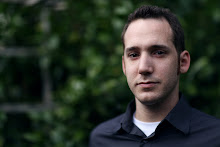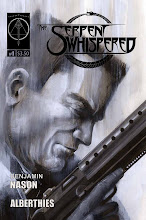Three men on horseback race across a desert landscape, we pull back to see a posse of riders are in hot pursuit. One of the three men being chased, Ben, deviates from the other two and takes his own course. He arrives at a small solitary house, set against a hillside, where a woman, Maria, is waiting for him. Before action can be taken the posse of men arrive, grab Ben, and hold Maria, making her watch as they tie his hands behind his back and place him on top of a horse, under a tree, with a noose around his neck. After Ben is dead the posse pulls him down, leaving him on the ground for Maria, who seethes with anger. The other two men being chased arrive at Ben and Maria's house to Maria burying Ben, they enter the house and dump two bags of gold on a table, which they divvy up between themselves and Maria, who now gets Ben's share of the heist they just pulled off. With a cold precision Maria takes the money to Ben's longtime friend, Manuel and presents him with an offer of paid revenge.
Cemetery Without Crosses, directed by French actor, Robert Hossein, is both one of the most tragic and artistic films the Spaghetti Western genre had to offer. Not quite as surreal as Giulio Questi's Django, Kill, or as hopeless as Sergio Corbucci's The Great Silence, Cemetery is perhaps the best example for the genre of a film that says everything in pictures and music and very little in dialogue. Taking a stripped-down narrative, a woman obsessed with revenge and the man she hires to carry it out, and adding several tropes of the genre, such as gangsters, quick-draws, and post-apocalyptic settings, Hosseing then forgoes the rest and takes us on a left turn away from typical Spaghetti Western territory. One of the film's strongest scenes comes around a dinner table, Manuel, who has reluctantly taken the revenge job, has infiltrated the family of gangsters he is to betray. Inviting him to dinner they all sit around as he eats and stare, the scene plays out completely silent. Manuel grows more and more paranoid as he is eating and looking around at them staring back. Frustrated he reaches for a can of mustard and squeezes it just hard enough that the top pops off and a Jack-in-the-Box pops out, causing him to jump. The rest of the table erupts in hysterical laughter. Manuel, having been played a prank on, has been accepted as one of them. In an interview with Robert Hossein for a featurette entitled "Ein Strick...ein Colt", he claims the scene was directed by his longtime friend, Sergio Leone.
To a better effect the same technique is used again later in the film in a scene that marks Cemetery as a standout from typical Italian Exploitation. Maria and Manuel stare at each other from opposite ends of main street in a dusty ghost town, as the two men who were once Ben's partners take advantage of a prisoner. The score echoes a melodramatic struggle between Manuel, who wants to do the right thing by his conscious, but also wants to help the bereaved of his once best friend find her solace, and Maria who's obsession for revenge has led her to such a vicious and personal betraying act, but can not, and will not, let it be stopped now.
Untypical of most Spaghetti Westerns, Manuel, the film's protagonist and revenger, in most cases takes a back seat to Maria, who's motivations are what pushes the film through to it's harrowing conclusion. He simply reacts to what is taking place around him, going about the pursuit of his job as if he knows it's inevitable but cares little in seeing it get there any faster. Perhaps a man with nothing better to do, and a longing for a woman who ended up in the arms of his best friend? Manuel offers what little voice of reason there is, carrying the wisdom of having walked the path of violence and revenge before; something we are only told through simple dialogue and intimations. He knows with Maria it is a hopeless cause, and ignores what appears to be his better judgment to see the scenario through to the end.
The action in Cemetery is sparse, precise, and very tame for the genre's usual standards of hyper-violence. What makes it an action film is not so much the physical proximity of gun play and fisticuffs but the way the story itself plays out the characters and the melodrama as a center piece for scenes of excitement that do take place. Hossein attempts to give us reason to care about the action, the violence, and it's consequences not just applaud it as spectacle. The spectacle it does provide is as cunning and terse as anything witnessed in the best of the genre. As an actor, Hossein gives Manuel's persona as a killer a mysterious and methodical background, something that is only personified by his wearing of a black glove, that he keeps in a jewelery box, on what is thought to be his shooting hand. When the moment comes to draw guns his opponents receive a wicked, rope-a-dope style treatment.
Unfortunately as of now the film has not received a proper American release, and is out of print from foreign sources: Une Corde, Un Colt - Cemetery Without Crosses - The Rope and the Colt



